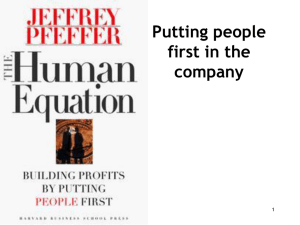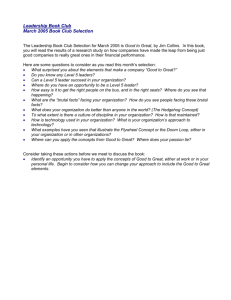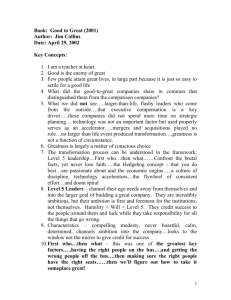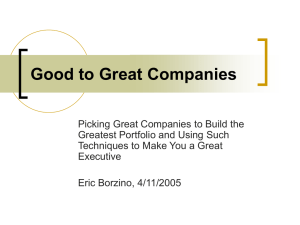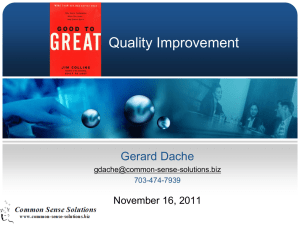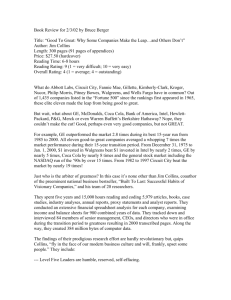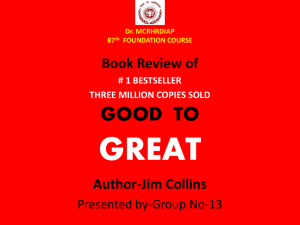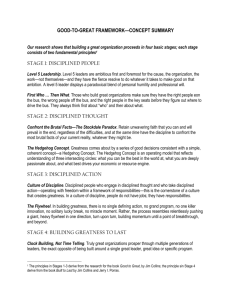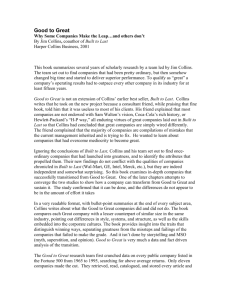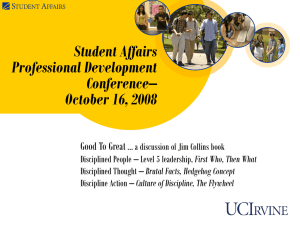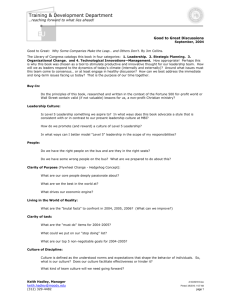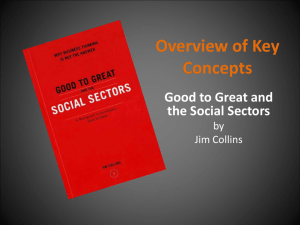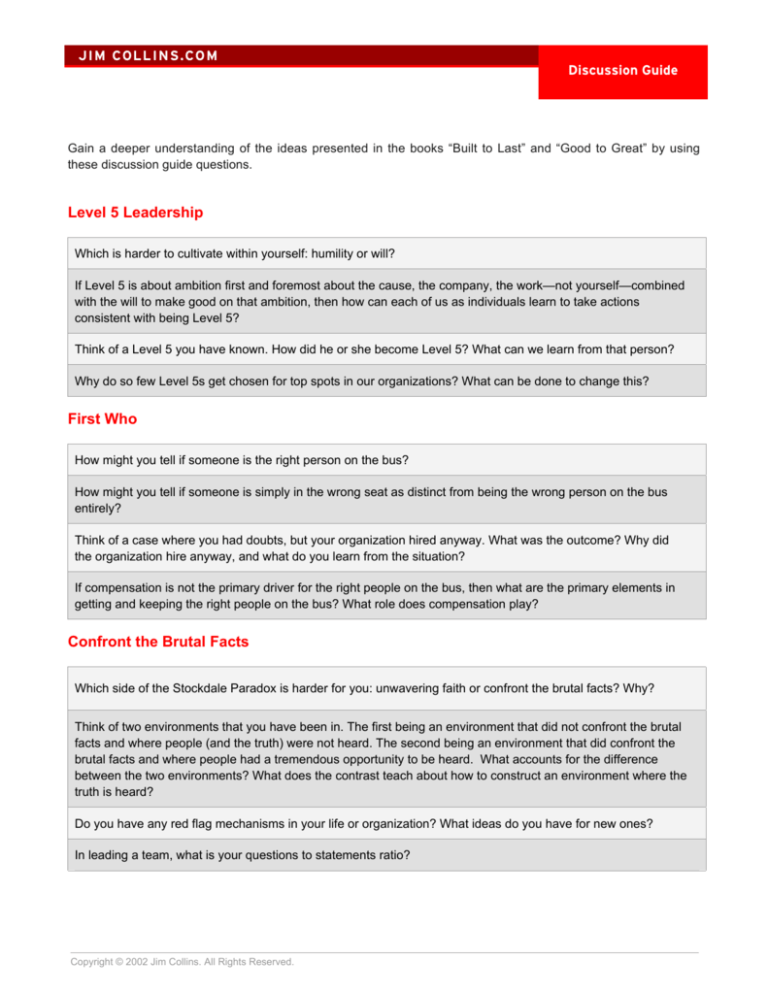
JI M COLL INS.CO M
Discussion Guide
Gain a deeper understanding of the ideas presented in the books “Built to Last” and “Good to Great” by using
these discussion guide questions.
Level 5 Leadership
Which is harder to cultivate within yourself: humility or will?
If Level 5 is about ambition first and foremost about the cause, the company, the work—not yourself—combined
with the will to make good on that ambition, then how can each of us as individuals learn to take actions
consistent with being Level 5?
Think of a Level 5 you have known. How did he or she become Level 5? What can we learn from that person?
Why do so few Level 5s get chosen for top spots in our organizations? What can be done to change this?
First Who
How might you tell if someone is the right person on the bus?
How might you tell if someone is simply in the wrong seat as distinct from being the wrong person on the bus
entirely?
Think of a case where you had doubts, but your organization hired anyway. What was the outcome? Why did
the organization hire anyway, and what do you learn from the situation?
If compensation is not the primary driver for the right people on the bus, then what are the primary elements in
getting and keeping the right people on the bus? What role does compensation play?
Confront the Brutal Facts
Which side of the Stockdale Paradox is harder for you: unwavering faith or confront the brutal facts? Why?
Think of two environments that you have been in. The first being an environment that did not confront the brutal
facts and where people (and the truth) were not heard. The second being an environment that did confront the
brutal facts and where people had a tremendous opportunity to be heard. What accounts for the difference
between the two environments? What does the contrast teach about how to construct an environment where the
truth is heard?
Do you have any red flag mechanisms in your life or organization? What ideas do you have for new ones?
In leading a team, what is your questions to statements ratio?
Copyright © 2002 Jim Collins. All Rights Reserved.
JI M COLL INS.CO M
Discussion Guide
Discussion
Guide – P2
Core
Ideology
Breakout Session—P2
Hedgehog Concept (the Three Circles)
How long, on average, did it take the good-to-great companies to clarify their hedgehog concepts? What
implications does this have about finding your own hedgehog concept?
Are you engaged in work that fits your own three circles: what you are passionate about, what you are
genetically encoded for, what you can get paid for? Do you need to change? Which circle is hardest to get right?
Why?
Which is more important for an organization: the goal to be the best at something, or realistic understanding of
what you can (and cannot) be the best at?
Can each sub-unit and each person have a hedgehog concept?
How is the hedgehog concept different for a nonprofit organization?
Culture of Discipline
If "rinsing your cottage cheese" is important, how do you tell *which* cottage cheese is worth rinsing? In other
words, if diligent attention to detail is essential, how do we decide which details are important, and which are
trivial?
Think of two people: One being someone who only sees his or her job as a "job" and the other who understands
that he or she has a responsibility. How does this difference play itself out in their work? What should we look
for in locating such people?
If class distinctions are deeply divisive, then why do organizations persist in creating an executive class that
separates itself from those who do the real work? If you ran the whole show, what would you remove to reduce
these class distinctions?
Do you have stop doing list? What do you put on your stop doing list?
Technology Accelerators
If technology cannot make or break a company's level of greatness, but only serves as an accelerator of
greatness or demise already in progress, then why did everyone fall in love with technology for technology's
sake during the 1990s?
Why is there so much hype and fear about new technologies, and what can you do to view new technologies
with objective equanimity?
Copyright © 2002 Jim Collins. All Rights Reserved.
JI M COLL INS.CO M
Discussion Guide – P3
Flywheel
Think of two organizations you've observed: one that followed the flywheel principle, and the other that fell into
the Doom Loop. What caused the difference between the two? What does your contrast teach about why do so
many organizations fall into the Doom Loop, rather than building momentum over the long term in the flywheel?
How do you know when it is time to change the direction of the flywheel?
If big change programs with lots of hoopla, tag lines, launch events, motivational meetings—and so forth—do
not lead to greatness, then why are such programs so common? What should be done instead of these
programs?
How can the flywheel concept apply to your own life and career?
Preserve the Core / Stimulate Progress
What are your core values?
What is your core purpose, beyond just making money?
What is your BHAG—big hairy audacious goal?
What is your first five-year base camp, on the way to achieving the BHAG?
What practices and strategies does your organization have that are dysfunctional and should be open for
change?
Copyright © 2002 Jim Collins. All Rights Reserved.

